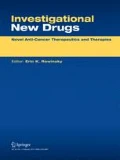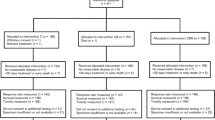Summary
Background and purpose Salvage therapies for urothelial carcinoma are needed. A single-arm trial in patients with advanced or metastatic urothelial carcinoma refractive to other therapies found that alisertib, a selective inhibitor of aurora kinase A, maintained stable disease in a few cases, despite a low objective response rate. To better understand why some patients benefited from alisertib, we genotyped the 22 patients of this pilot trial for two single nucleotide polymorphisms (rs2273535 and rs1047972) in AURKA, the gene encoding aurora kinase A, and looked for associations with survival and treatment response. Results Carrier status for the minor allele of rs2273535 (T91A, p. F31I) was a favorable prognostic factor for progression-free survival (HR = 0.18; 95% CI, 0.039–0.81; P = 0.026) but not for overall survival (HR = 0.88; 95% CI, 0.26–2.9; P = 0.83). These results were confirmed in multivariable analyses, adjusting for sex, age and hemoglobin, for both progression-free survival (HR = 0.11; 95% CI, 0.018–0.69; P = 0.018) and overall survival. No association was found between rs1047972 and survival. Moreover, neither SNP was associated with treatment response. Conclusion In patients who received alisertib for advanced or metastatic urothelial carcinoma, longer progression-free survival was observed in carriers of the minor allele A of rs2273535 in AURKA than in patients who were homozygous for the major allele T. This finding, based on a small pilot trial, warrants further investigation.

Similar content being viewed by others
References
Raggi D, Miceli R, Sonpavde G, Giannatempo P, Mariani L, Galsky MD, Bellmunt J, Necchi A (2016) Second-line single-agent versus doublet chemotherapy as salvage therapy for metastatic urothelial cancer: a systematic review and meta-analysis. Ann Oncol 27:49–61
Rosenberg JE, Hoffman-Censits J, Powles T, van der Heijden MS, Balar AV, Necchi A, Dawson N, O'Donnell PH, Balmanoukian A, Loriot Y, Srinivas S, Retz MM, Grivas P, Joseph RW, Galsky MD, Fleming MT, Petrylak DP, Perez-Gracia JL, Burris HA, Castellano D, Canil C, Bellmunt J, Bajorin D, Nickles D, Bourgon R, Frampton GM, Cui N, Mariathasan S, Abidoye O, Fine GD, Dreicer R (2016) Atezolizumab in patients with locally advanced and metastatic urothelial carcinoma who have progressed following treatment with platinum-based chemotherapy: a single-arm, multicentre, phase 2 trial. Lancet 387:1909–1920
Massard C, Gordon MS, Sharma S, Rafii S, Wainberg ZA, Luke J, Curiel TJ, Colon-Otero G, Hamid O, Sanborn RE, O'Donnell PH, Drakaki A, Tan W, Kurland JF, Rebelatto MC, Jin X, Blake-Haskins JA, Gupta A, Segal NH (2016) Safety and efficacy of Durvalumab (MEDI4736), an anti-programmed cell death ligand-1 immune checkpoint inhibitor, in patients with advanced urothelial bladder cancer. J Clin Oncol 34:3119–3125
Necchi A, Lo Vullo S, Mariani L, Raggi D, Giannatempo P, Calareso G, Togliardi E, Crippa F, Di Genova N, Perrone F, Colecchia M, Paolini B, Pelosi G, Nicolai N, Procopio G, Salvioni R, De Braud FG (2016) An open-label, single-arm, phase 2 study of the aurora kinase a inhibitor alisertib in patients with advanced urothelial cancer. Investig New Drugs 34:236–242
Ke YW, Dou Z, Zhang J, Yao XB (2003) Function and regulation of aurora/Ipl1p kinase family in cell division. Cell Res 13:69–81
Kufer TA, Sillje HH, Korner R, Gruss OJ, Meraldi P, Nigg EA (2002) Human TPX2 is required for targeting aurora-a kinase to the spindle. J Cell Biol 158:617–623
Lei Y, Yan S, Ming-De L, Na L, Rui-Fa H (2011) Prognostic significance of aurora-a expression in human bladder cancer. Acta Histochem 113:514–518
Sen S, Zhou H, Zhang RD, Yoon DS, Vakar-Lopez F, Ito S, Jiang F, Johnston D, Grossman HB, Ruifrok AC, Katz RL, Brinkley W, Czerniak B (2002) Amplification/overexpression of a mitotic kinase gene in human bladder cancer. J Natl Cancer Inst 94:1320–1329
Manfredi MG, Ecsedy JA, Chakravarty A, Silverman L, Zhang M, Hoar KM, Stroud SG, Chen W, Shinde V, Huck JJ, Wysong DR, Janowick DA, Hyer ML, Leroy PJ, Gershman RE, Silva MD, Germanos MS, Bolen JB, Claiborne CF, Sells TB (2011) Characterization of alisertib (MLN8237), an investigational small-molecule inhibitor of aurora a kinase using novel in vivo pharmacodynamic assays. Clin Cancer Res 17:7614–7624
Cervantes A, Elez E, Roda D, Ecsedy J, Macarulla T, Venkatakrishnan K, Rosello S, Andreu J, Jung J, Sanchis-Garcia JM, Piera A, Blasco I, Manos L, Perez-Fidalgo JA, Fingert H, Baselga J, Tabernero J (2012) Phase I pharmacokinetic/pharmacodynamic study of MLN8237, an investigational, oral, selective aurora a kinase inhibitor, in patients with advanced solid tumors. Clin Cancer Res 18:4764–4774
Ju H, Cho H, Kim YS, Kim WH, Ihm C, Noh SM, Kim JB, Hahn DS, Choi BY, Kang C (2006) Functional polymorphism 57Val > Ile of aurora kinase a associated with increased risk of gastric cancer progression. Cancer Lett 242:273–279
Kimura MT, Mori T, Conroy J, Nowak NJ, Satomi S, Tamai K, Nagase H (2005) Two functional coding single nucleotide polymorphisms in STK15 (aurora-a) coordinately increase esophageal cancer risk. Cancer Res 65:3548–3554
Tang W, Qiu H, Ding H, Sun B, Wang L, Yin J, Gu H (2013) Association between the STK15 F31I polymorphism and cancer susceptibility: a meta-analysis involving 43,626 subjects. PLoS One 8:e82790
Tang W, Qiu H, Jiang H, Wang L, Sun B, Gu H (2014) Aurora-a V57I (rs1047972) polymorphism and cancer susceptibility: a meta-analysis involving 27,269 subjects. PLoS One 9:e90328
Clayton D (2011) dgcGenetics: Personal library of functions for genetics. R package version 1 06
Dickson MA, Mahoney MR, Tap WD, D'Angelo SP, Keohan ML, Van Tine BA, Agulnik M, Horvath LE, Nair JS, Schwartz GK (2016) Phase II study of MLN8237 (alisertib) in advanced/metastatic sarcoma. Ann Oncol 27:1855–1860
Acknowledgements
Valerie Matarese provided scientific editing.
Author information
Authors and Affiliations
Corresponding author
Ethics declarations
Conflict of interest
The authors declare that they have no conflict of interest.
Funding
The study was partially supported by Millennium Pharmaceuticals, Inc., a wholly owned subsidiary of Takeda Pharmaceutical Company Limited. The company had no role in the design or conduction of the study, in the collection, analysis or interpretation of the data, or in the preparation, review and approval of the manuscript.
Ethical approval
All procedures performed in the present study, involving human participants, were in accordance with the ethical standards of the institutional and national research committee and with the 1964 Helsinki Declaration and its later revisions and amendments.
Informed consent
Informed consent was obtained from all participants included in the study.
Additional information
Andrea Necchi and Giulia Pintarelli contributed equally to the study.
Rights and permissions
About this article
Cite this article
Necchi, A., Pintarelli, G., Raggi, D. et al. Association of an aurora kinase a (AURKA) gene polymorphism with progression-free survival in patients with advanced urothelial carcinoma treated with the selective aurora kinase a inhibitor alisertib. Invest New Drugs 35, 524–528 (2017). https://doi.org/10.1007/s10637-017-0440-5
Received:
Accepted:
Published:
Issue Date:
DOI: https://doi.org/10.1007/s10637-017-0440-5




